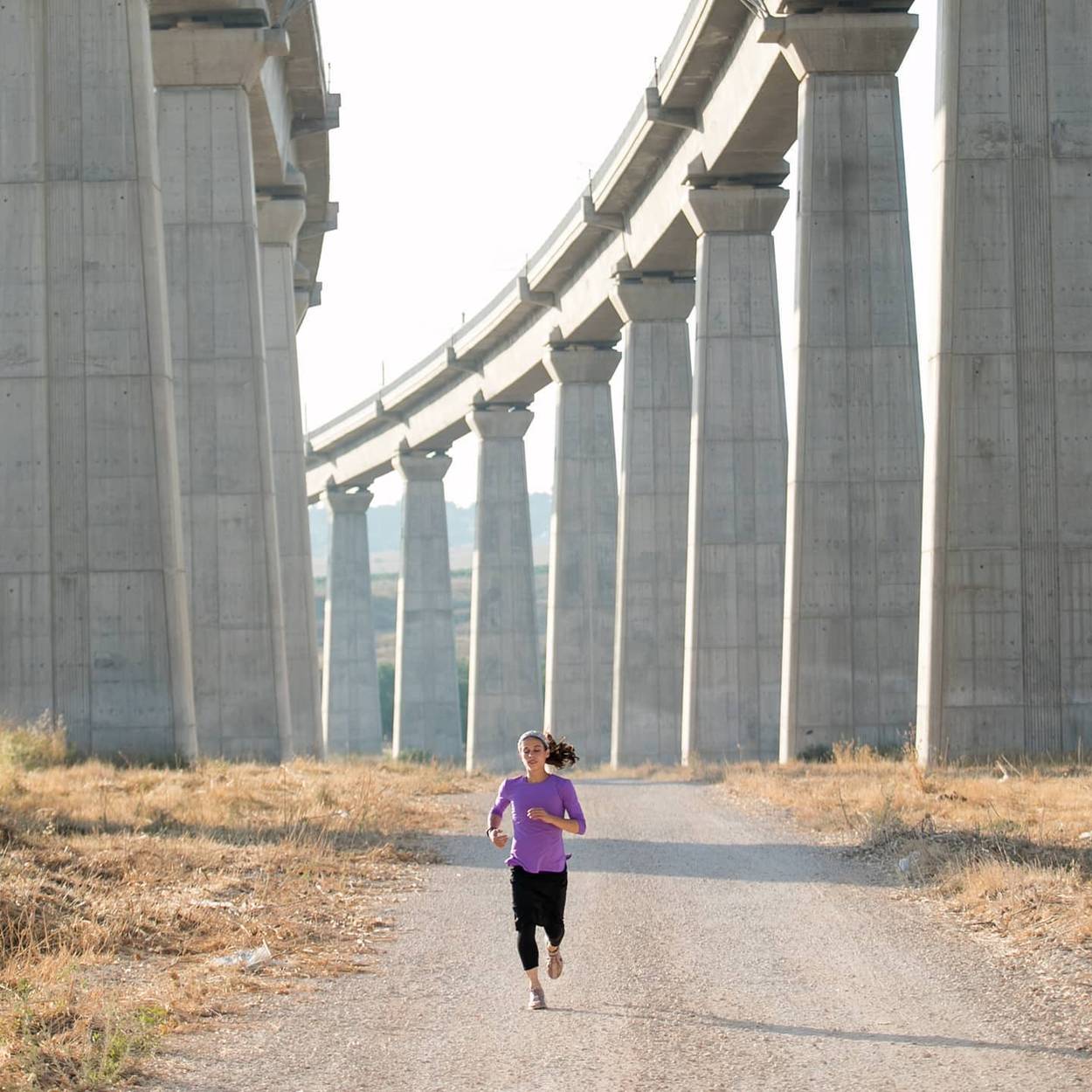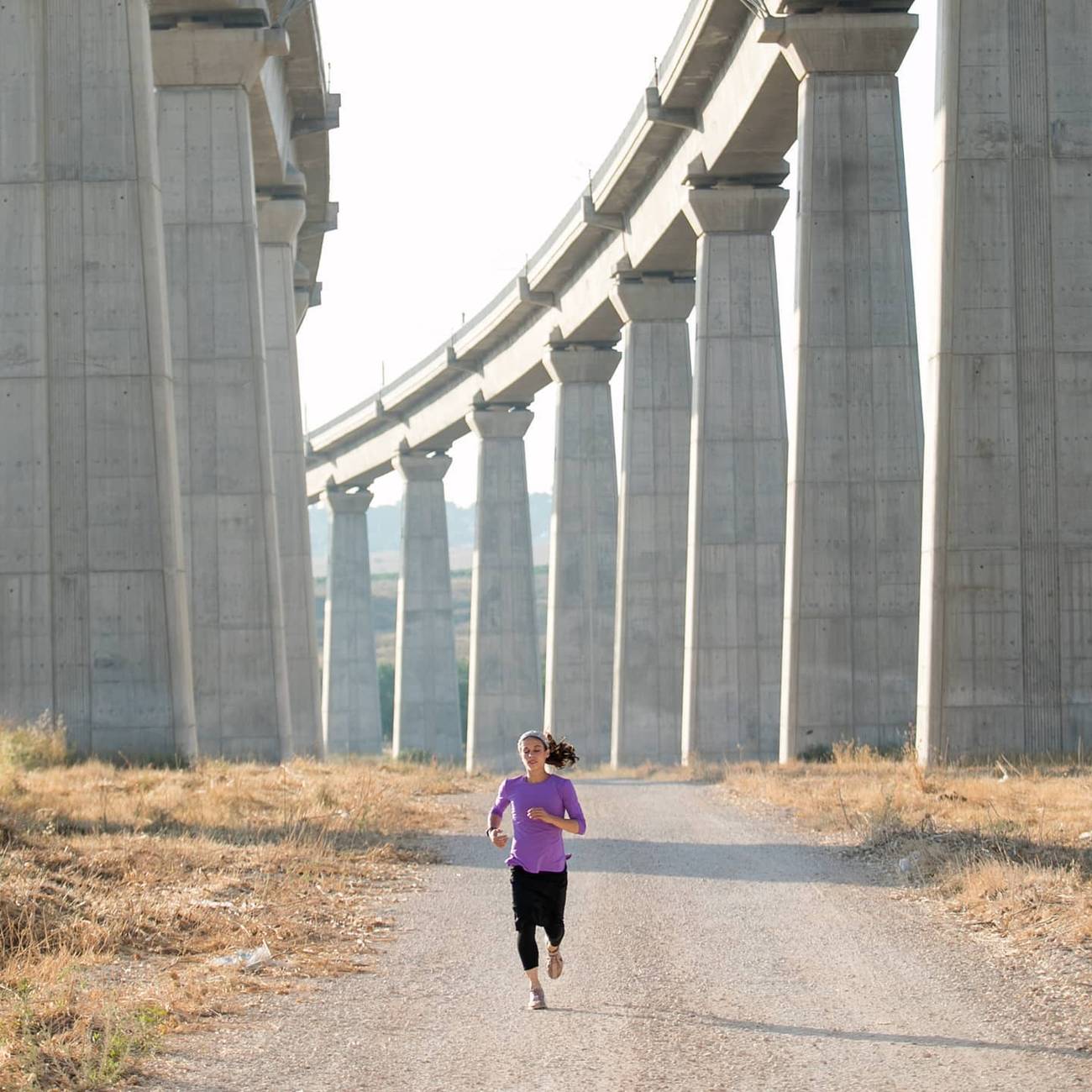Orthodox Women Put On Their Running Shoes
In Israel, the fitness trend has become ‘a revolution’ among religious women




Ayelet Duskis, an accountant married to an Orthodox rabbi, was never into exercising. “I was your typical smart and studious kollel wife,” said Duskis, who lives in the central Israeli city of Rehovot. But when her fifth child was a year old, Duskis weighed more than she ever had, and her father was also suddenly hospitalized with a heart condition. “It was a wake-up call for me,” she said. “I realized that I hadn’t really taken care of myself or my body.”
So, with the encouragement of her husband, who has long participated in various sports, she downloaded the app Couch to 5K, put on an old skirt that covered her knees, and set out on her first workout, which included alternating one minute of running with 90 seconds of walking, for a total of 20 minutes.
Fast-forward three years, and Duskis now runs several kilometers most days of the week, often with her husband or children, outfitted in a sweat-wicking, long-sleeve top and running skirt, with all of her hair hidden under a scarf. “Some people stare at me because they don’t expect to see a religious woman running, or don’t understand why someone would run in long sleeves in a hot climate,” she said. “But it keeps my heart healthy and also makes me a better mother. Running is a cathartic experience for me.”
Duskis’ story is increasingly common among religious Jewish women in Israel. Despite a long-standing taboo around exercising in public, more religious women are taking up running for both its physical and mental benefits. The trend comes among other changes in religious society, including increased higher education, more wealth, and greater exposure to the world through social media; it has also tracked with the larger trend in Israel, as running has become more popular in general over the past decade. Another factor is the influence of Beatie Deutsch, Israel’s fastest female marathon runner—who is also a Haredi mother of five: Since May, her image has been on a large billboard alongside a central Israeli highway, part of an advertising campaign for Adidas, with the slogan “Impossible Is Nothing.”
“It’s really been a revolution,” said Miri Forst, founder of Israel’s nationwide women’s running program Baguf Bari, or “In a Healthy Body,” which has attracted more than 6,000 members—the majority of them religious—since 2012.
To Forst, who belongs to the Hasidic Chabad movement, large numbers of religious women running once seemed nearly impossible. “I did my first race, 10 kilometers, in 2012,” she said. “At that race I saw immediately that there were so few women in general, and even fewer religious women in the race, so I decided we could try to change this.” She had started to run on her own and train for this event after realizing through years of trying other forms of exercise—including becoming a certified instructor for aerobics and Pilates, which have long been popular activities for women in her community—that running was the best way for her to feel fit both physically and mentally. She put out advertisements for a women’s running group, first in her hometown of Rehovot, then in other places, including nearby Ramat Gan and Petah Tikva. She advertised her Baguf Bari program to women without a lot of athletic experience, saying the training would get them running 10 kilometers over the course of 24 weeks.
“Almost all the women who showed up were Haredi or religious to some degree,” Forst said. “It’s a sign that many were looking for something like this.”
Now, the program has dozens of training groups all over the country, and about 80% of participants are religious to some degree, and many reflect this by wearing skirts or fuller-coverage clothing. The groups practice a few days a week, and many members participate in organized running races around the country.
On a recent summer evening, under a full moon, about 20 women, most wearing skirts of varying lengths along with bright pink Baguf Bari running shirts, gathered near Jerusalem’s Gan Sacher park. Many greeted each other with laughs, smiles, and hugs, and quickly fell into conversation as they formed a circle to do stretching exercises. A few minutes later, they began a jog of about 3 kilometers on the path through the park, past families out with children, people walking dogs, and solo runners—many of them shirtless men.
Most of the women, including those from Haredi communities, said that as long as they dressed themselves in a certain way, there was no religious issue with running outdoors in public—mainly because it is seen as good for one’s health, a key Torah value.
“I asked my rabbi, and he said it was fine because this is something for my health,” said a runner named Hadas, a mother of eight and grandmother of 18 who has come from the Jerusalem suburb of Mevaseret Zion to run with the group each week for the past two years. “So I just wear long sleeves and a skirt and it’s fine.” But she does draw the line at participating in races, which she says “are more problematic because they are social events where men and women go together, and are not strictly for health.”
Finding what many of these women consider appropriate clothing for running has become easier in recent years, with the growth of the modest fashion market, another factor that has raised the profile of sports among religious Jewish women.
“It removes the barrier to participate and enjoy these activities,” said Nava Brief Fried, co-founder and CEO of ModLi, a Jerusalem-based online marketplace for modest swim and exercise clothing. But despite the increased availability of appropriate sportswear, this commandment of tzniut—modesty—is also an emotional and complicated topic for many runners, and can force them to get more clarity on their commitment to certain Jewish traditions. Deutsch, who has made headlines over the past few years for quickly rising from a mother who took up running to get in shape to a professional athlete and marathoner, shared in a recent Instagram post that she struggles with the topic.
For a long time, as someone who grew up religious, modesty was “just what I did ... because everyone else did. And I accepted it,” wrote Deutsch, who runs in shirts that cover her collar bones and elbows, a head scarf, and skirts and leggings that cover her knees, often custom-made by top athletic clothing companies. Only now has she had to confront her clothing choices. “Today, for the first time ever, I literally felt like my clothing could have made a difference in my workout times,” she wrote. “I don’t find modesty empowering. I’d actually find it a lot more empowering to rock a crop top as a mom who’s given birth five times right now.” Ultimately, however, she concluded that she will not change her modest style, and for now looks at it as a way to remember to be humble: “As an athlete who works hard, it can be easy to get caught up in the feeling ‘It’s all my work that got me here.’ When I dress modestly I remind myself that my speed is a gift from God.”
Many women said seeing Deutsch, along with her candid discussions of how she incorporates running into a religious lifestyle, was a key inspiration.
“My daughter wants to be Beatie Deutsch, and has started running with me,” said Duskis.
The greater participation of religious women in running, along with other changes in Orthodox communities, is also due to a diversification of those societies in Israel, said Adam Ferziger, professor of Jewish history and contemporary Jewry at Bar Ilan University. He points to the growing numbers of secular people (who may already be involved in athletics) who have become religious, a process known in Hebrew as hazarah b’tshuva; another issue is the immigration of Haredim from the United States, where more Orthodox Jews participate in athletics and follow sports teams.
“When you have a society that is less monolithic, elements that were less present enter via the periphery, and then over time filter into the center as well,” Ferziger said. “Sports might not be mehadrin [appropriate for the highest level of observance] but it’s also hard to say it’s treyf, especially if there is a health benefit from it. In traditional Halacha, health is the most compelling matir, or basis for permitting something otherwise forbidden or not generally done.”
Running in general has also risen in popularity in Israel in recent years, said David Felberg, who does marketing for Marathon Israel, which co-founded the Tel Aviv and Jerusalem marathons and organizes other races, including 5K and 10K events; participation in these races has tripled in the past five years, although most events are still 75% men. “Sometimes you look around and it seems everybody’s running,” Felberg said. “Just go to Tel Aviv’s Yarkon Park on a Friday morning.”
For many female religious runners, what may have started out as an activity for health has evolved into much more, including a social outlet and friendships with women from different backgrounds.
“There is something special about running together,” said Hagit Nir, who coaches the Jerusalem Baguf Bari group, and considers herself traditional rather than religious. “It really makes all of us start talking, and we end up talking about everything. Stuff just flows out of you when you run.”
Running has also become yet another bond among religious women who take it up.
“Whenever I pass another religious woman, we smile at each other,” said Duskis. “Because we both know we are doing something against the norm, but also something so important for ourselves.”
Sara Toth Stub is a Jerusalem-based American journalist who has written for The Wall Street Journal, Dow Jones Newswires, Associated Press, and other publications.